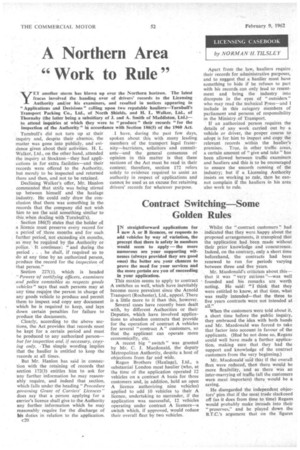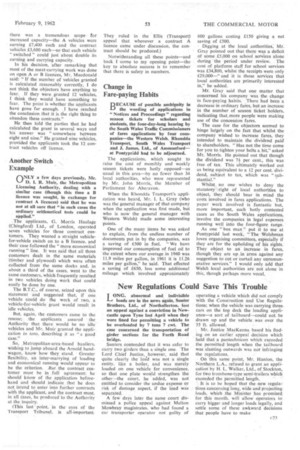Contract Switching—Some Golden Rules
Page 52

Page 55

If you've noticed an error in this article please click here to report it so we can fix it.
IN straightforward applications for 1 new A or B licences, or requests to add vehicles by way of variation, the precept that there is safety in numbers would seem to apply — the more numerous are your supporting witnesses (always provided they are good ones) the better are your chances to prove the need for your services and the more certain are you of succeeding in your application.
This maxim seems to apply to contract A switches as well, which have inevitably become more prevalent since the Arnold Transport (Rochester), Ltd., appeal. There is a little more to it than this, however.
Several cases have recently been dealt with, by different Authorities or their Deputies, which have involved applications to abandon contracts that provide for the operation of contract A vehicles for several "contract A" customers, so that the applicant can operate more economically, etc.
A recent big " switch " was granted by Mr. C. J. Macdonald, the deputy Metropolitan Authority, despite a host of objections from far and wide.
Regan Brothers (Haulage), Ltd., a substantial London meat haulier (who, at the time of the application operated 12 vehicles on a contract A basis for three customers and, in addition, held an open A licence authorizing nine vehicles) applied to add 10 vehicles to their A licence, undertaking to surrender, if the application was successful, 12 vehicles operating under contract A licences—a switch which, if approved, would reduce their overall fleet by two vehicles. Whilst the "contract customers" had indicated that they were happy about the proposed arrangements, it transpired that the application had been made without their prior knowledge and concurrence. Indeed, on the contrary, only a short time beforehand, the contracts had been renewed to run for periods varying between three and five years.
Mr. Macdonald's criticism about this— that it was "very curious "—was well founded and his remarks are worth noting. He said: "I think that they were entitled to know, at that time, what was really intended—that the three to five years contracts were not intended at all."
When the customers were told about it, a short time before the public inquiry, they embraced the idea with both hands and Mr. Macdonald was forced to take that factor into account in favour of the applicants. (Had he not done so, Regans could well have made a further application, making sure that they had the support and knowledge of the contract customers from the very beginning.) Mr. Macdonald saki that if the overall fleet were reduced, then there would be more flexibility, and as there was an inter-marrying of traffic (all the customers were meat importers) there would be a saving.
He disregarded the independent objectors' plea that if the meat trade slackened off (as it does from time to time) Regans would probably make inroads into their "preserves," and he played down the B.T.C.'s argument that on the figures
there was a tremendous scope for increased capacity—the A vehicles were earning £7,400 each and the contract vehicles £3,600 each—so that each vehicle " switched " could just about double its earning and carrying capacity.
In his decision, after remarking that most of the meat-carrying work was done on open A or B licences, Mr. Macdonald said: "If the number of vehicles granted is calculated reasonably correctly, I do not think the objectors have anything to fear, If they were granted 12 vehicles, I think they would have something to fear. The point is whether the applicants have gone far enough. I have reached the conclusion that it is the right thing to abandon these contracts."
He then told the parties that he had calculated the grant in several ways and his answer was "somewhere between eight and nine." He granted nine vehicles, provided the applicants took the 12 contract vehicles off licence.
















































































































